
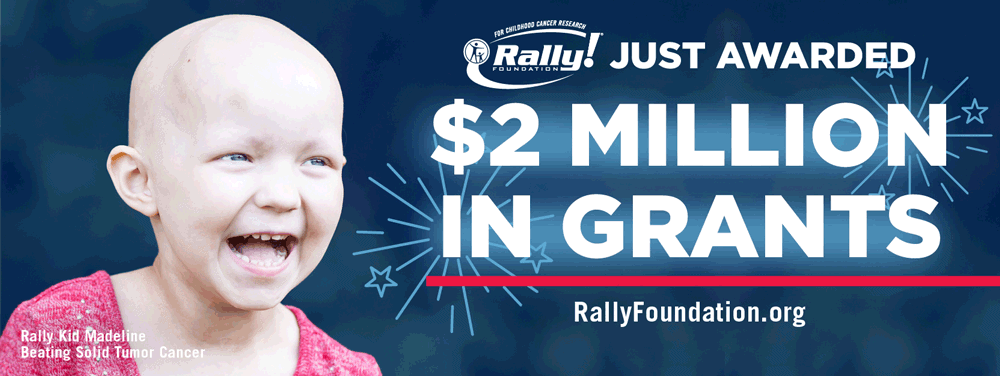
$2 Million in Grants!
Can you believe it? Rally Foundation for Childhood Cancer Research just awarded $2 million in childhood cancer research grants. If you had asked us one year ago today, this is not what we would have predicted. It is because of you that we were able to do this. Thank you! Thank you to our supporters and Rally Challenge Teams who made each of these grants possible by adjusting the way funds were raised. Thank you to our Rally Medical Advisory Board who offered guidance when so much was unknown. Thank you to our partners in the Collaborative Pediatric Cancer Research Awards Program: The Truth 365, Infinite Love for Kids Fighting Cancer, Open Hands Overflowing Hearts, Luke Tatsu Johnson Foundation, Leukemia and Lymphoma Society, CureSearch for Children’s Cancer, National Pediatric Cancer Foundation and the Osteosarcoma Institute; like-minded foundations working together to co-fund projects...

“See You On Monday”
A year ago Friday I looked at the Rally staff and said, “See you on Monday.” On Saturday, I spent the day doing research on COVID-19. By Saturday night I was looking up best practices for working from home. On Sunday, I called the leadership team together. Within two hours we had three Zoom accounts and a meeting scheduled with the whole team. I told the Rally team we would be sheltering in place and meeting by Zoom each morning and afternoon. I broke the news that we would not have any of our three scheduled Rally On the Runway events and that the advocacy team would not be going to Washington, D.C. the next week as planned. I shared that we were going to take our inspiration from our Rally families, who adjust and readjust almost on a daily basis without seemingly missing a beat. One team member said, “Childhood cancer isn’t going to take a break because of this pandemic, and neither...
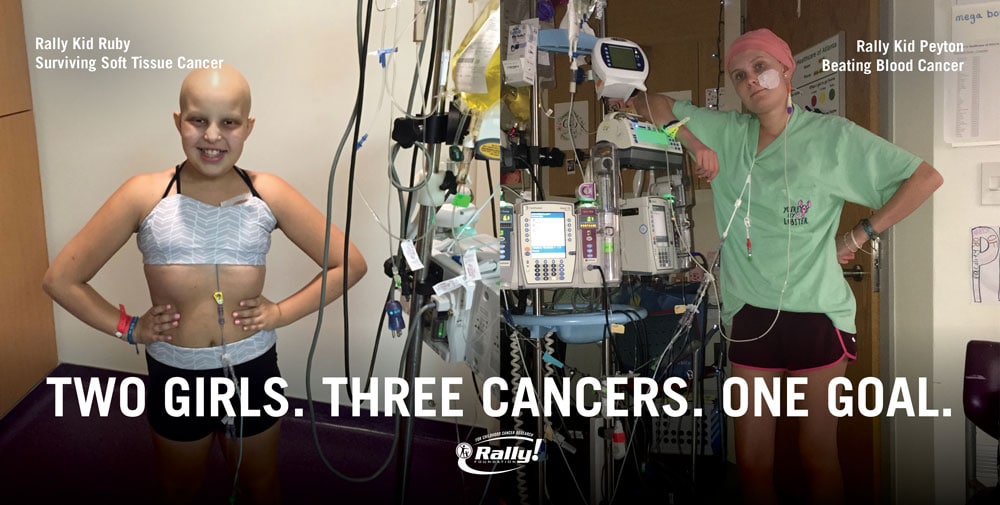
Two Girls. Three Cancers. One Goal.
When Rally Kid Peyton was 15, her life was going as planned. She filled her time with rigorous academics, cross country and lacrosse. Nearing the winter of her sophomore year, Peyton’s quick feet began holding out and persistent headaches became unbearable. To Peyton's “utter disappointment” she was diagnosed with two types of leukemia. Peyton soon began a five-month treatment plan, receiving chemotherapy, full-body radiation and a bone marrow transplant. Sadly, she relapsed almost immediately. Peyton had to start treatment again, including a clinical trial and another bone marrow transplant. Her chances of survival were slim. But Peyton—being the strong and relentless fighter she is—persevered through her second battle against leukemia. A year and a half following her initial diagnosis, Peyton was finally cancer-free! I too was a normal kid before cancer. I spent my days dancing at my...
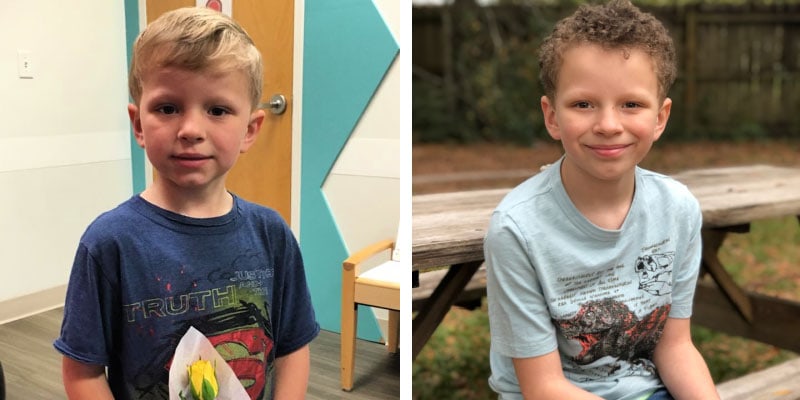
What is Langerhans Cell Histiocytosis (LCH)?
Langerhans cell histiocytosis (LCH) is a rare disorder in which the body produces an overabundance of Langerhans cells. These cells, which are also known as histiocytes, are a type of white blood cell that helps the immune system fight off infections. LCH causes too many of these cells to form, ultimately resulting in a buildup in the body. This accumulation of cells then damages organs, forms tumors, and otherwise disrupts normal tissue functions. According to the Histiocytosis Association, approximately one in 200,000 children is diagnosed with LCH. LCH is classified into three syndromes: Eosinophilic granuloma: the most common type that occurs most often in children who are five to 15 years of age Hand-Schüller-Christian disease: a chronic form of LCH that is typically diagnosed before the age of five Letterer-Siwe disease: a rare and potentially fatal syndrome that affects children...
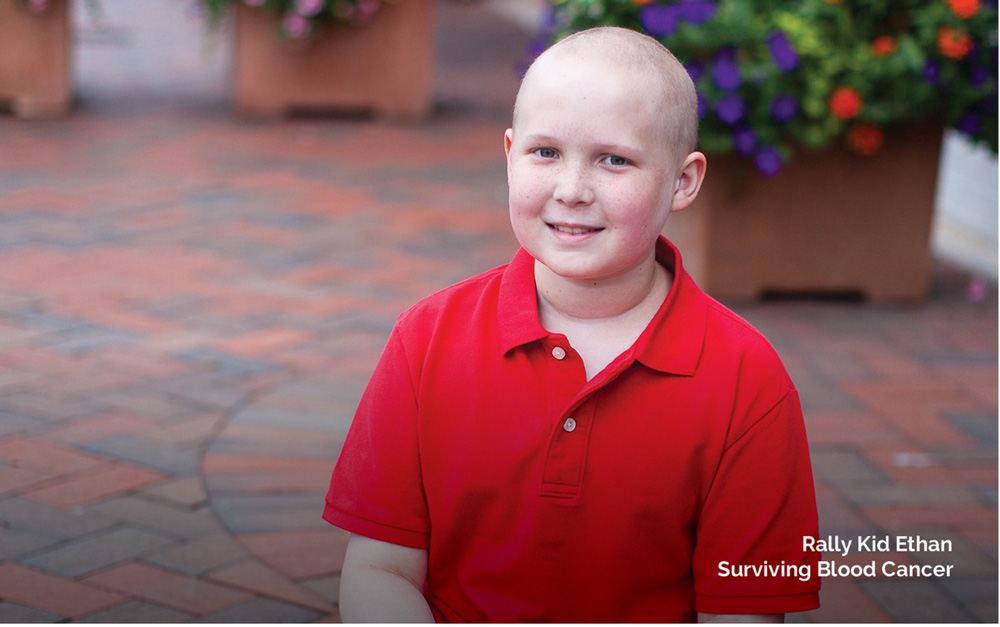
What is Lymphoma?
Lymphoma is a cancer of the body’s lymphatic (lymph) system which is essential to the immune system. The lymphatic system is made up of a type of white blood cells also known as lymphocytes which flow throughout the whole body. These lymphocytes fight infections throughout the body, so when cancerous cells begin to grow they can quickly spread through the entire lymph system. This then makes it difficult for the immune system to work properly. Early symptoms of lymphomas usually begin with a swollen lymph node near the neck, underarms, collarbone or groin. Other symptoms may include: Cough Chest pain Fatigue Fever Night sweats Shortness of breath Swollen abdomen Unexplained weight loss Two types of lymphoma are diagnosed in children, teens and young adults: Hodgkin lymphoma and Non-Hodgkin lymphoma. Hodgkin lymphoma is a cancer of the lymph nodes, and more common in teens and young...
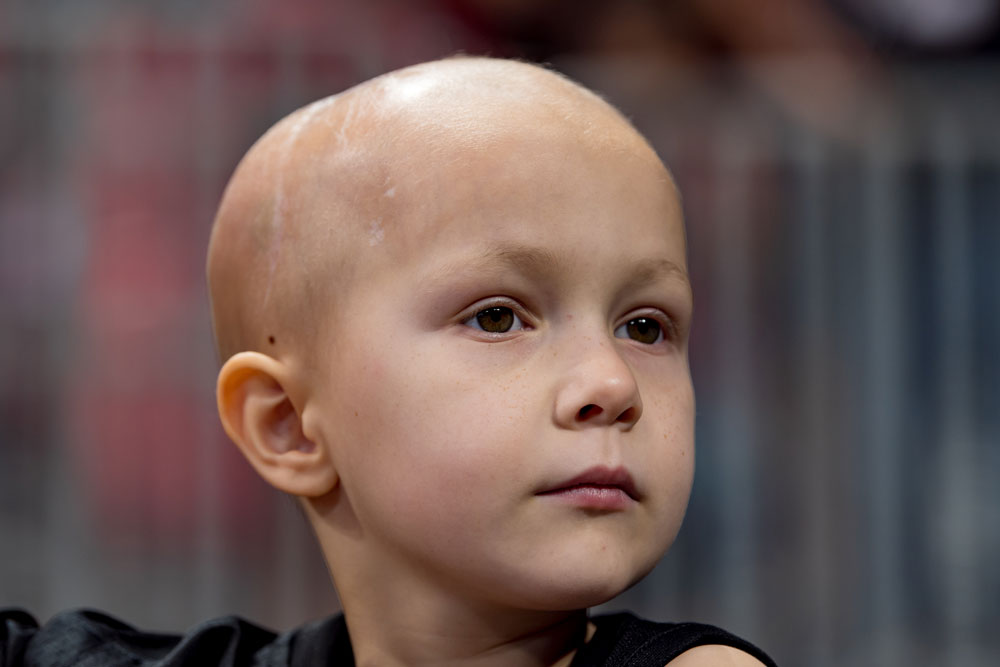
What is Ependymoma?
Ependymoma is a tumor that appears most often in the brain and sometimes in the spinal cord. It is a type of glioma, meaning it starts in the support cells of the brain. This cancer occurs more frequently in children—accounting for 5-10% of all pediatric brain tumors—but it can also affect adults. Common pediatric subtypes include classic ependymoma, a tumor that most commonly appears in the brain, and anaplastic ependymoma, which tends to spread and has a high chance of recurrence. Each type is classified into three grades (I, II and III) with grade III having the fastest growth. Signs and Symptoms of Ependymoma The signs and symptoms of pediatric ependymoma can vary widely depending on where the tumor is located. “Often, it can be hard to distinguish subtle symptoms from much more common problems, such as viral infections, injuries or other illnesses,” explained Dr. Eugene Hwang. Dr....

$2 Million in Grants!
Can you believe it? Rally Foundation for Childhood Cancer Research just awarded $2 million in childhood cancer research grants. If you had asked us one year ago today, this is not what we would have predicted. It is because of you that we were able to do this. Thank you! Thank you to our supporters and Rally Challenge Teams who made each of these grants possible by adjusting the way funds were raised. Thank you to our Rally Medical Advisory Board who offered guidance when so much was unknown....

“See You On Monday”
A year ago Friday I looked at the Rally staff and said, “See you on Monday.” On Saturday, I spent the day doing research on COVID-19. By Saturday night I was looking up best practices for working from home. On Sunday, I called the leadership team together. Within two hours we had three Zoom accounts and a meeting scheduled with the whole team. I told the Rally team we would be sheltering in place and meeting by Zoom each morning and afternoon. I broke the news that we would not have any of our...

Two Girls. Three Cancers. One Goal.
When Rally Kid Peyton was 15, her life was going as planned. She filled her time with rigorous academics, cross country and lacrosse. Nearing the winter of her sophomore year, Peyton’s quick feet began holding out and persistent headaches became unbearable. To Peyton's “utter disappointment” she was diagnosed with two types of leukemia. Peyton soon began a five-month treatment plan, receiving chemotherapy, full-body radiation and a bone marrow transplant. Sadly, she relapsed almost...

What is Langerhans Cell Histiocytosis (LCH)?
Langerhans cell histiocytosis (LCH) is a rare disorder in which the body produces an overabundance of Langerhans cells. These cells, which are also known as histiocytes, are a type of white blood cell that helps the immune system fight off infections. LCH causes too many of these cells to form, ultimately resulting in a buildup in the body. This accumulation of cells then damages organs, forms tumors, and otherwise disrupts normal tissue functions. According to the Histiocytosis Association,...

What is Lymphoma?
Lymphoma is a cancer of the body’s lymphatic (lymph) system which is essential to the immune system. The lymphatic system is made up of a type of white blood cells also known as lymphocytes which flow throughout the whole body. These lymphocytes fight infections throughout the body, so when cancerous cells begin to grow they can quickly spread through the entire lymph system. This then makes it difficult for the immune system to work properly. Early symptoms of lymphomas usually begin with a...

What is Ependymoma?
Ependymoma is a tumor that appears most often in the brain and sometimes in the spinal cord. It is a type of glioma, meaning it starts in the support cells of the brain. This cancer occurs more frequently in children—accounting for 5-10% of all pediatric brain tumors—but it can also affect adults. Common pediatric subtypes include classic ependymoma, a tumor that most commonly appears in the brain, and anaplastic ependymoma, which tends to spread and has a high chance of recurrence. Each type...
